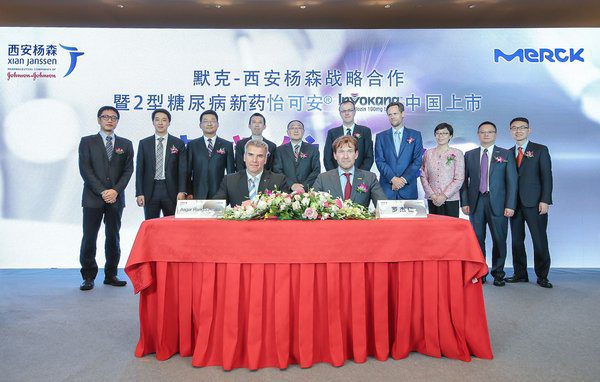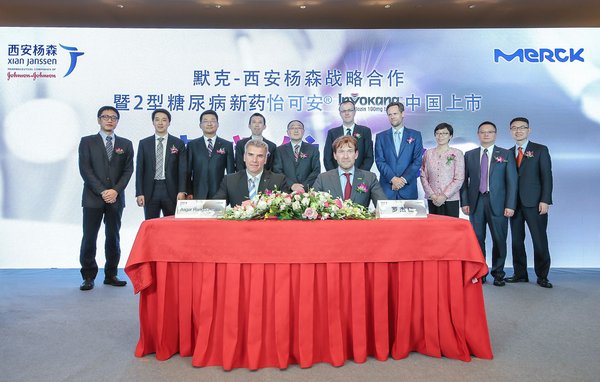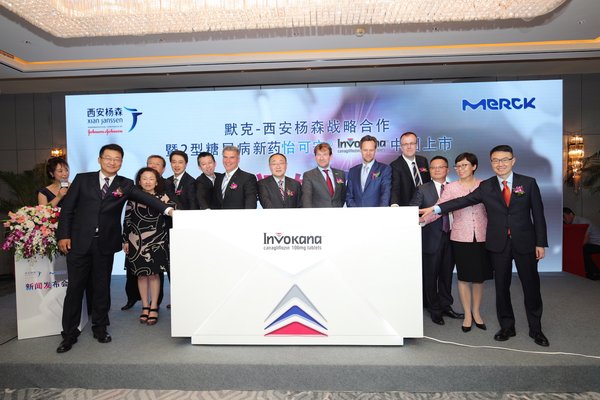BEIJING, July 12, 2018 /PRNewswire/ — Merck, a leading science and technology company, signed an agreement with Xian Janssen Pharmaceuticals Ltd. in Beijing on July 11, to launch INVOKANA® (canagliflozin), an innovative drug for adults with type 2 diabetes.
“Our mission is to transform 40 million patients’ lives in China by 2025. We are very pleased to be collaborating with Xian Janssen, who shares our goal of helping improve the lives of people living with or at risk of type 2 diabetes. Merck has been making continued efforts to expand its portfolio with the aim of providing more high-quality medicines and better treatment options for millions of diabetic patients in China. The introduction of INVOKANA® to China reinforces our long-term commitment to China“, said Rogier Janssens, Managing Director and General Manager of Merck’s biopharma business in China.

Speech from Rogier Janssens, Managing Director and General Manager of Merck’s biopharma business in China
Through this agreement, the two companies will work closely together on future development, distribution, promotion, access, marketing and sales of INVOKANA® (canagliflozin) in the country and Merck will hold the exclusive rights for INVOKANA® (canagliflozin)’s promotion in China.
INVOKANA® (canagliflozin) is a member of a novel class of drugs known as sodium-glucose co-transporter 2 (SGLT-2) inhibitor and was approved in China in September 2017. INVOKANA® (canagliflozin) is approved for treatment of type 2 diabetes in combination with metformin or with metformin plus sulfonylurea in adults who have not achieved adequate glycaemic control on these oral therapies.
With a mechanism of action that is independent of insulin secretion and sensitivity, INVOKANA® (canagliflozin) helps reduce the reabsorption of filtered glucose in the kidneys and lowers the renal threshold for glucose(RTG)and thereby increases urinary glucose excretion through inhibition of highly selective SGLT-2.Besides its pronounced anti-hyperglycemic effects, INVOKANA® (canagliflozin) can also bring additional benefits to patients such as reductions in body weight, slowing the progression in albuminuria and lowering of blood pressure[1]. By adding INVOKANA® (canagliflozin), another novel therapy following Glucophage® (metformin hydrochloride), and other diabetes’ products, to its diabetes portfolio, Merck is committed to providing Chinese patients with better treatment options for their diabetes and complications, leading to better quality of life.
According to the 2017 International Diabetes Federation (IDF) Diabetes Atlas, China has more than 114 million people living with diabetes, the largest number of any country in the world. Additionally, data from the China Guideline for the Prevention of Type 2 Diabetes (2017 Edition)[2]shows that in China the prevalence of type 2 diabetes among the adult population is 10.4%. Research also shows that the number of people with diabetes is rising year on year, with patients often being diagnosed at a younger age and many still struggling to control their blood sugar level. Indeed, approximately half of adults with the disease do not achieve recommended levels of glucose control[3], which increases the risk of potentially life-threatening complications, such as heart disease, stroke, renal failure, and diabetic retinopathy.
Under the Healthy China 2030 Initiative, health of the Chinese people has been given strategic importance. The Chinese government has gradually introduced a shift of focus from disease treatment to disease prevention.
“With poor lifestyle choices, particularly in relation to exercise and diet, the number of diabetic patients is increasing rapidly all over the world. More effective treatment options are needed to help diabetic patients control the disease and improve their overall quality of life”, said Ji Linong, a professor from Peking University People’s Hospital and chairman of the International Diabetes Federation Western Pacific Region (IDF-WPR), speaking at the signing ceremony. Prof. Ji also emphasized the importance of seeking medical advice at certified hospitals as well as early diagnosis and early intervention to improve treatment outcomes. He highlighted that healthy diet and lifestyle change are an important way to help prevent diabetes.
Merck
Merck is a leading science and technology company in healthcare, life science and performance materials. Around 50,000 employees work to further develop technologies that improve and enhance life – from biopharmaceutical therapies to cancer treatment or multiple sclerosis, cutting-edge systems for scientific research and production, to liquid crystals for smartphones and LCD televisions. In 2017, Merck realized sales of EUR 15.3 billion in 66 countries.
Founded in 1668, Merck is the world’s oldest pharmaceutical and chemical company. The founding family remains the majority stakeholder of the publicly listed group. Merck holds the global patent rights to the Merck name and brand, with the only exceptions of the United States and Canada, where the company operates as EMD Serono, MilliporeSigma and EMD Performance Materials.
Merck China Healthcare
With nearly 2,000 employees and footprint throughout the country, Merck Healthcare is committed to serving China and markets with 16 medicines in 7 major therapeutic areas. Merck Healthcare China has broad expertise in fertility and thyroid therapeutic areas, and has strong presence in CV, endocrinology and oncology. The R&D Beijing Hub, established in November 2009, is an integrated R&D facility, aimed at stimulating innovation, introducing new medicines to China and the rest of Asia, and leading research and development into new treatment solutions for critical diseases in Asia.
Merck’s main therapeutic areas include fertility, oncology, cardiovascular, surgery and emergency, thyroid disease, diabetes, allergy. Product brands include Gonal-f® to treat infertility, the assistive reproduction products Ovidrel® , Luveris® , Cetrotide® , and Crinone® ; oncology product Erbitux® for the treatment of RAS WT mCRC; Concor® for high blood pressure, Stilamin® for acute gastrointestinal diseases, Euthyrox® for hypothyroidism and Thyrozol® for hyperthyroidism, Glucophage®, Glucophage XR® Glufast® for diabetes and Doxium® for diabetic ophthalmic complication, and NHD for allergies.
|
[1] Stenlof K,et al.Diabetes Obes Metab. 2013 APr;15(4):372-82 |
|
[2] Wang L, Gao P, Zhang M, et al. JAMA, 2017 |
|
[3] Bailey CJ, Kodack M. Patient adherence to medication requirements for therapy of type 2 diabetes. Int J Clin Pract. 2011;65:314–322. |
Photo – https://photos.prnasia.com/prnh/20180712/2183178-1-a
Photo – https://photos.prnasia.com/prnh/20180712/2183178-1-b
Photo – https://photos.prnasia.com/prnh/20180712/2183178-1-c






Facebook Comments